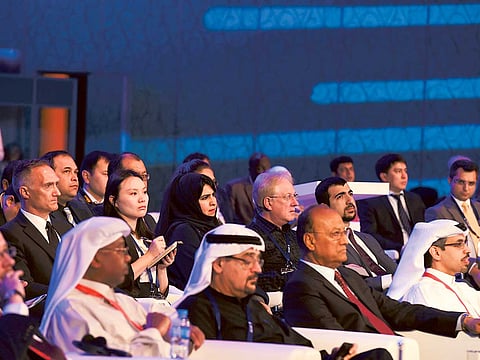Ex-Soviet states hope Iran’s return will relieve oil collapse pressures
The lifting of sanctions against Iran and China’s efforts to revive ancient Silk Road may hand struggling former Soviet states a lifeline

Dubai: Kazakhstan and Azerbaijan, the former Soviet Union’s second and third largest oil producers, see the lifting of Iranian sanctions as a major opportunity to relieve their crisis-hit economies.
Azerbaijan’s manat and Kazakhstan’s tenge were the two worst performing currencies in 2015 with both losing around half their value, a consequence from the collapse in oil prices.
But the lifting of sanctions against Iran last month and China’s efforts to revive the ancient Silk Road may hand the struggling former Soviet states a lifeline.
“It’s going to be a game changer ... the opening of Iran,” Taleh Ziyadov, Director-General of Azerbaijan’s state-owned Baku International Sea Trade Port, said at the Commonwealth of Independent States (CIS) Global Business Forum in Dubai on Thursday.
Azerbaijan is looking at linking the Iranian port city of Bandar Abbas, located near the tip of the Arabian Gulf, to Helsinki, Finland, by rail, Ziyadov said.
Azerbaijan, which borders Iran to the south, sees itself connecting Iran with Europe through its northern border with Russia.
“Geographically, by default, we are in a very good location,” he said.
Trans-Asian trade route
But Kazakhstan is also pitching itself as a major transport hub for Iranian goods.
This week, a 32-container cargo train travelled from China to Iran using a rail network that passed through Kazakhstan. The trans-Asian trade route took just 14 days by rail — a month less than the journey by sea.
The train journey is part of China’s One Belt, One Road development policy to relink itself with Europe and the Mediterranean by land and sea through Central Asia and the Middle East.
Ratings Agency Standard & Poor’s downgraded Kazakhstan’s credit rating to BBB- from BBB and left it with its negative outlook due to concerns about inflation. In January, annual inflation in Kazakhstan increased to 14.4 per cent.
“The [Iranian] region itself is becoming more and more important,” Kanat Alpysbayev, Vice President for Logistics at state-owned Kazakhstan Railways said.
He said there is a “a lot of interest” in the railway from Russian steel and grain producers, while there is potential for Iranian goods to enter Central Asia through Kazakhstan.
Growth
Iran’s economy will grow by an average of 8 per cent over the next five years, Mohammad Nahavandian, the chief of staff to Iran’s president, said last month at the World Economic Forum in Davos.
“Iran may be one of the most promising emerging markets in the coming decades,” he said.
But the country where development of key infrastructure, including transport, suffered under years of sanctions, will need its neighbours and others to help it import and export goods. Azerbaijan and Kazakhstan hope they will be its partners.



